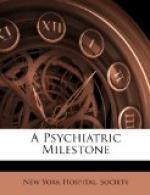The conduct of living beings is a special form of reaction by which the living being adapts himself to the society to which he belongs. The primitive adaptations of life are characterized by the organization of internal physiological functions. Later on they consist in external reactions, in displacements, in uniform movements of the body which either keep him from or draw him near to the surrounding bodies. The first of these movements are the reflex movements, then are developed those combinations of movements which we called perceptive or suspensive actions in keeping with perceptions. Later came the social acts, the elementary intellectual acts which gave birth to language, the primitive voluntary acts, the immediate beliefs, then the reflected acts, the rational acts, experimental, etc. As I said formerly, there is, in each function, quite a superior part which consists in its adaptation to the particular circumstance existing at the present moment. The function of alimentation, for instance, has to exercise itself at this moment when I am to take aliments on this table in the midst of new people, that is to say, among whom I have not yet found myself in this circumstance, wearing a special dress and submitting my body and my mind to very particular social rites. In reality it is nevertheless the function of alimentation, but it must be noted that the act of dining, when wearing a dress suit and talking to a neighbor, is not quite the same physiological phenomenon as the simple secretion of the pancreas. Certain patients lose only the superior part of this function of alimentation which consists in eating in society, in eating in new and complex circumstances, in eating while being conscious of what one is doing, and in submitting to rules. Although the physiologist does not imagine that these functions are connected with the exercise of sexual functions in humanity, there is a pathology of the betrothal and of the wedding-tour.
It is just on this superior part of the functions, on their adaptation to present circumstances, that the disorders of conduct (self-government) which occupy us to-day bear. If one is willing to understand by the word “evolution” the fact that a living being is continually transforming himself to adapt himself to new circumstances, neuroses and psychoses are disorders or halts in the evolution of functions, in the development of their highest and latest part.[16]




